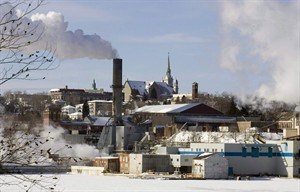
Smoke rises from the Abitibi-Consolidated mill in Shawinigan, Que., on Jan. 29, 2007. The environmental advisory body that Ottawa is killing off has issued a final tally of how well federal and provincial governments are meeting their greenhouse-gas targets. The answer, given in great detail in a "reality check:" not so well. THE CANADIAN PRESS/Paul Chiasson
June 13, 2012 - 7:04 AM
OTTAWA - The environmental advisory body that Ottawa is killing off has issued a final tally of how well federal and provincial governments are meeting their greenhouse-gas targets.
The answer, given in great detail in a "reality check:" not so well.
The National Round Table on the Environment and the Economy added every provincial and federal measure — existing and proposed — to reduce emissions.
Canada is on track to achieve only half of its 2020 target to reduce greenhouse gases by 17 per cent below 2005 levels, the report says.
"Canada will not achieve its 2020 GHG emissions reduction target unless significant new, additional measures are taken. More will have to be done. No other conclusion is possible," it concludes.
Indeed, the federal environment commissioner and many analysts have reached the same conclusion. This report, however, is the first full accounting to add every initiative on the books and project emissions out to 2020 and 2030.
The federal government, after several false starts, has decided to regulate each carbon-producing sector one by one, implementing the rules gradually over the coming years.
Provinces have taken their own paths, with British Columbia implementing a carbon tax and Quebec heading toward a cap-and-trade system.
"The history of this file has been fragmented, uneven, uncertain and therefore uncontrollable in terms of saying here's what the outcomes are going to be," the round table's president, David McLaughlin, said in an interview.
So far, provinces are more effective than the federal government in reducing emissions. They are collectively responsible for 75 per cent of the reductions in the pipeline so far — although that may change as the federal government's regulations fall into place.
Even so, the report warns that since each province is acting alone, and the federal government rarely acts in concert with provincial provisions, overlap and policy gaps are a certainty.
"Governments have talked, have acted to some degree, but sustained progress that Canadians can count on is not yet taking place," says McLaughlin in an introduction to the report.
"We need to move beyond current approaches and have a truly pan-Canadian dialogue on how to do this better. If not, Canada's 2020 target will remain a hope, not a reality."
It is possible to catch up and meet the emissions reduction target — but only at a high cost, and with unprecedented federal-provincial co-operation, McLaughlin says.
The provinces have all told him they want more certainty in federal policy, and they also want Ottawa to at least consider additional measures that would put a price on carbon, he added.
Key to making progress is Alberta.
Since most of Canada's future emissions will be coming from the oil and gas sector, emission reductions from Alberta will need to make up at least half of the country's total, if the target is to be met.
All other provinces will need to increase their efforts too, even though Nova Scotia and Saskatchewan are on track to achieve their internal targets, and Ontario is close.
"Put succinctly, Canada's target cannot be achieved without emissions reductions in Alberta, but Alberta alone cannot achieve Canada's target," the report says.
The federal government needs to take the lead, and collaborate with provinces in a formal forum that allows all jurisdictions to make serious commitments, McLaughlin said.
The federal government has made an effort to move out of areas of shared jurisdiction. When it comes to the environment, Ottawa is now scaling back its role in environmental assessment, allowing the provinces more scope.
And when it comes to tackling greenhouse gas emissions in particular, the federal government has consistently ignored the round table's advice to put a price on carbon and act quickly, in order to spare the country from an expensive panic later.
Now, the federal government is shutting down the round table itself, saying its research can be found elsewhere.
The round table's report contradicts that claim, pointing out that Environment Minister Peter Kent actually commissioned the emissions tally, saying the round table was in "a unique position to advise the federal government on sustainable development solutions."
News from © The Canadian Press, 2012